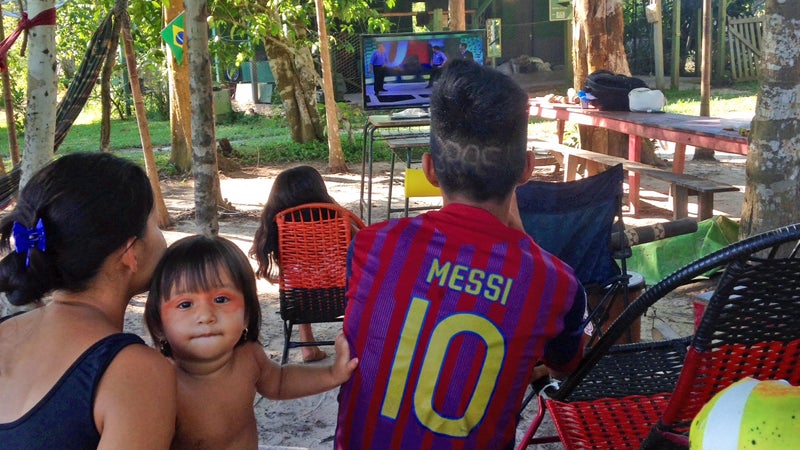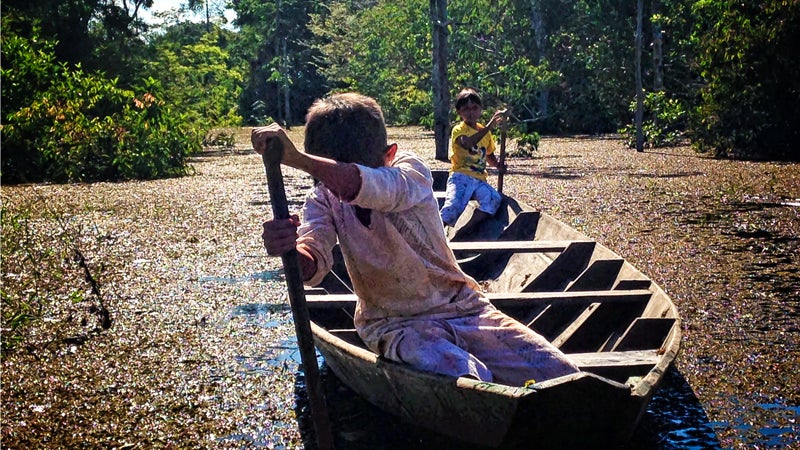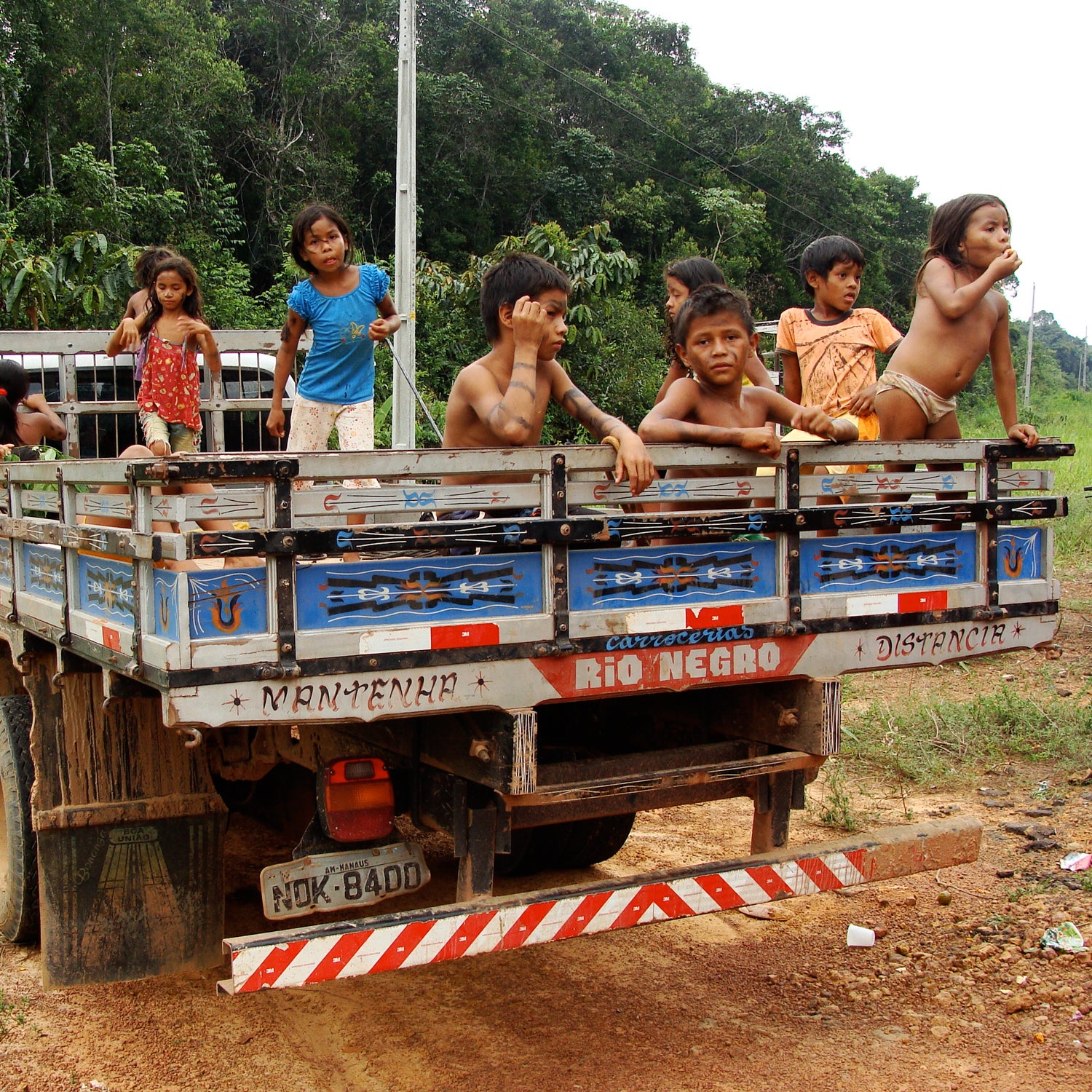The Tururukari-Uka tribe will not go extinct under Francisco Uruma’s watch.
During this summer’s FIFA World Cup in Brazil, Uruma and his extended family to the tribe’s plot of land outside Manaus, hoping to kickstart an ecotourism business that could help the community balance heritage and modernity in the Internet age. But can their way of life be preserved—and is tourism the right way to do it?
Uruma’s grandfather, Waldomiro Cruz, devoted his life to protecting the region’s remaining Kambeba tribes, fighting for land rights and rekindling their legends in the face of modernization. Now the survival of the tribe rests with 35-year-old Uruma. “I want every child to adapt and be prepared for today’s world,” he says.
That’s challenging when even basic needs aren’t always met. “The government doesn’t know our reality,” Uruma said. “We have basic desires. Water. Health. Education.” Last year, the young chief represented 10 regional tribes in Brasilia, lobbying lawmakers for more land and better services. “I met people who share the same vision. I learned how we can take matters into our own hands.”
For Uruma, securing basic needs means transforming his village into an ecotourism start-up. With support from Guedes and the Amazonas state tourism agency, Uruma and his tribal counsel are preparing the village—and building a website—to welcome paid visitors to the tribe beginning in November. The goal is for each of the tribe’s 15 families to earn $500 per month from tourist fees and the sale of merchandise and services.
Uruma has modeled that adaptability by working with a man he calls “Professor”—, an executive coach from Manaus who has spent the last two years preparing the young chief to preserve an ancient culture in one of the most rapidly changing regions in South America.
“This is the only tribe in Brazil—and possibly the only tribe in the world—that has enlisted the help of leadership coaching,” Guedes said. “We focus on improving Francisco’s interpersonal skills, his self-awareness, his self-motivation, and his ability to respond to new situations.”

In June, I accompanied Guedes on a visit to the Tururukari-Uka village outside Manaus to watch Brazil and Cameroon play a World Cup match on satellite TV. After an hour-long bus ride north of the capital, we took a dirt road to a lakeshore. Guedes stood at the water’s edge, cupped his hands to his mouth, and hollered into the jungle. From the forest we heard the faint response of a World Cup noisemaker. A few minutes later, two boys in a canoe paddled through the trees and we climbed aboard.
“These boys are 10 years old,” Guedes said as the boys steered us to their waterside community. “At the age of 9, they are men. There is no adolescence here.”
After hundreds of years of nomadic life, the Tururukari-Uka settled here in 2004 when the elder chief persuaded local authorities that the tribe needed a stable home so their children could get a better education. Their plot of land is about the size of seven soccer fields (including one actual soccer field) where the 56-person tribe farms, hunts, and fishes for sustenance. In a grass-roofed schoolhouse at the center of the village, the children learn traditional subjects like math and geography alongside the Kambeba language and ancestral legends.
Generating their livelihood independently of other tribes will allow the Tururukari-Uka tribe to preserve the integrity of their own language and culture. Over time, he wants to invite up to 50 visitors per day to sample their food and drink, witness their dance and music, buy artisanal crafts–even have their marriage vows renewed by a shaman.
Watching the game with the tribe, I felt an awkward mix of wonder and trespass, hanging out in their open-air living room to feast on slow-roasted fish, drink fresh-squeezed passion fruit, and bang drums to celebrate Brazil’s goals. At intermission the children performed dances and songs and demonstrated their prodigious ability to climb trees. I couldn’t help but wonder where Uruma’s culture ended and Guedes’ coaching began. Then the match resumed and we returned to our seats in front of the TV.
“I know,” Guedes said, looking almost apologetic. “They can show you more than 20 different things about Kambeba culture, and here we are watching soccer. But the World Cup has been a good warm-up for them. A chance to see what it’s like to have visitors.”

Those gathered around the television seemed to be enjoying the new experience, especially the children, but this was a highly curated visit. While most of the tribe seemed to be rallying around Uruma’s vision, it’s hard to say how attitudes might change once the novelty wears off. Walking around the village, I noticed at least one member of the tribe watching the game in the privacy of his own house, decidedly uninterested in entertaining.
As the match disintegrated into a blowout, my wonder turned to worry. To ensure his tribe’s future, Uruma is being urged to sell a romanticized vision of the past that’s not always authentic. What are the consequences of asking these children not only to learn their culture, but also to perform it for outsiders? To complicate matters, the Brazilian government wants more—not less—ecotourism. In September, Guedes travelled to Boston to deliver a conference presentation on his progress with the Tururukari-Uka, arguing that his methodology is replicable in other indigeneous communities. By this time next year, thousands of their pictures could materialize on the social networks of the world, hashtag Indians hashtag Amazon hashtag wow. Will filtered and tagged tourist pics be the last evidence of this ancient way of life?
Guedes and Uruma will tell you that the benefits outweigh the potential consequences, but you have to wonder what conversations take place in private between Uruma and his grandfather. What rituals are not for sale?
When Brazil scored its fourth goal, the cheering tribe passed around a basket of popcorn. I had a second helping of fish, played a game of soccer with the kids, and set my worries aside for a while as the sunset filtered through the trees. I’ve seen the theme park version of tourism in the Amazon–piranha fishing contests and Cayman night hunting and rubber tapping to make condoms–homogenized thrills that usually line the pockets of corporate operators in Manaus.
Uruma’s vision is to showcase the daily life of a single tribal group—his family—and if there proves to be an appetite for that experience, the profits will go directly to his loved ones in this village. Yes, in a perfect world, the tribe could sustain itself on exactly its own terms, but maybe ecotourism is a step toward that world. When Uruma talks about Kambeba culture, he talks not about the past, but about the future.
“The way of life is different now,” Uruma says. “When they leave the tribe to study, it’s hard for them to come back and become farmers. Our vision is for our children to go to the city and show people our way of life, to learn how to become doctors and teachers and lawyers, then come back and help our tribe in other ways.”
So far, two young members of the Tururukari-Uka tribe have gone on to attend university. Márcia Kambeba recently graduated from the University of Amazonas with an M.A. in history and now lives at the mouth of the Amazon in Belém, where she has formed a musical group that recites poetry and sings songs of Kambeba culture. At this moment, Adana Kambeba is in medical school at the Federal University of Minas Gerais and hopes to return to Amazonas to practice indigenous medicine.
“Our culture will not fall into oblivion,” Uruma says. “20 years from now, when my grandchildren are alive, I don’t want them to know their people through books.”


